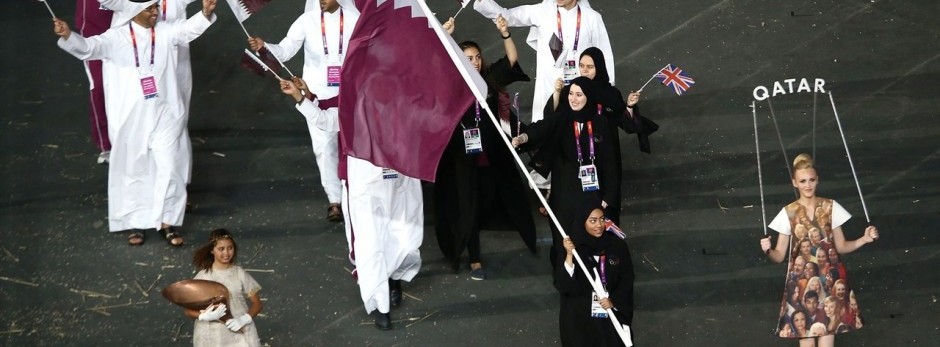Female Athletes Lead Teams: What Does It Mean?
As a devout opening and closing ceremony skeptic, I missed the first fifteen minutes of the London Olympics opening jamboree sure in the knowledge that they’re all naff, incomprehensible wastes of money or in the case of Beijing, a freakish show of iron population control and a waste of money. Curiosity got the better of me, however, and after I started watching I was enthralled.
After the theatrics had finished– James Bond with Queen Elizabeth II and all – I watched the start of the athlete procession planning to switch off and finally go to bed. But again, this too was oddly compelling and I noticed that there were a surprising number of female athletes as flag carriers for Arab countries.
It started off surprisingly strongly. After Algeria’s typical male opening Bahrain, the Comoros Islands, and Djibouti (of all places) were led out by ladies. Iraq and Jordan followed too with female flag bearers.
Eventually, with Qatar and Somalia surprising many by being led by female athletes, the final tally for the Arab world was nine out of the twenty-two nations being female-led, more than double the 2008 Olympic tally of four female flag bearers for Arab States.
Does it mean anything?
Given the near-parity of females to men leading out the teams in a region that is resolutely male-dominated, clearly something is afoot. Is the answer as simple as ‘the Arab Spring’? Do states’ athletic federations, extensions of the governments, feel obliged to field female flag bearers as some kind of notion that they are ‘moving with the times’? It is tempting to make such a conclusion, and there may be something to it, but aside from vague notions that this ‘might make sense’, there is no evidence on which one can draw.
A more fruitful approach would be to look at the states individually to discern if any rhyme or reason can be found.
The countries
No-one is surprised that Qatar led with a female athlete. Indeed, given the influence of Sheikha Moza here for many years now, QF’s emphasis on female empowerment, and the ever upcoming 2022, it would have been a surprise had they not led with a female athlete. This is wholly in keeping with the ‘Western-friendly’ face that Qatar likes to present at these jamborees. It is likely that they can’t make much of a splash on the pitches, fields, mats, and pools, but they can in other ways. Moreover, when you’re bordered by a luddite-like state like Saudi Arabia, I’m always convinced that the Qataris can’t resist poking and prodding away, noting that while they may be of the same religious denomination, they are nevertheless vastly different.
After being led out by a lady in Beijing, the UAE reverted to a man this year (who was dressed like some kind of paramilitary-type: very odd). I doubt that there’s much significance to this and while one could make jibes about the UAE trying to maintain a highly traditional status quo (to wit: Al Islah) above all else, this may be a digression too far.
Great play has been made of the fact that Saudi Arabia finally sent women to the Games. And they should be congratulated on this. But I almost think that they should leave their female athletes at home if they’re going to make them walk x paces behind the men; a truly medieval moment there, I thought, revealing a bit too much about the underlying mindset. And as for KSA’s bitter protests that they will withdraw their team if their female athlete cannot wear her hijab in her event, I truly can’t explain in words how little I would care if KSA withdraw. I utterly fail to see why anyone is giving this temper-tantrum the slightest attention.
No-one is overly surprised that Bahrain had a female flag carrier. It was thus in Beijing and this time around I’m not sure whether Bell Pottinger or Qorvis gave them any choice.
Seeing as Egypt can’t even arrange to buy non-knock off kit, I doubt that anyone could entertain a conversation about have a lady leading them out or not so they stuck to the norm. And otherwise in North Africa, aside from Morocco, it was as per usual.
But perhaps most surprisingly of all, what were the odds that Djibouti and Somalia would have female athletes leading the states out? Forgive my naivety and my resort to cliché, but these places don’t seem to be the most advanced places in terms of equality. Granted, it was a fifty-fifty choice for the Somali team with only two competitors, but still, they went for the lady; good for them. A good image to show to the world at least.
Overall
So, does this mean anything? I suspect not, though I am something of an incorrigible cynic. I think that a wave of feminism would be one of the greatest waves that could fall over the Middle East, but it does not appear to be that close at hand. As ever, it is one step forward and any number backwards. Certainly it is a good sign that KSA sent women for the first time; hopefully they will send more next time and they’ll not be made to derisively walk behind the men.




3 Responses to Female Athletes Lead Teams: What Does It Mean?
You must be logged in to post a comment Login